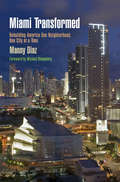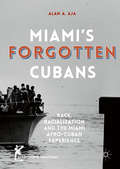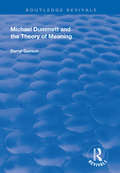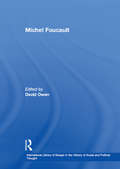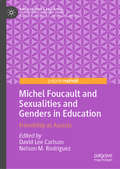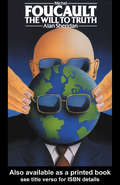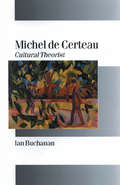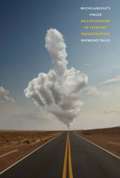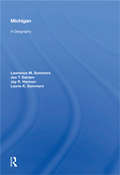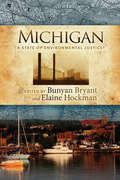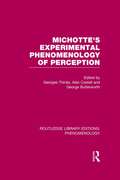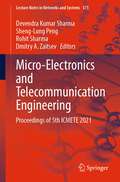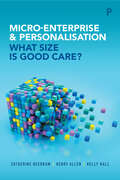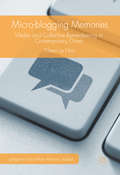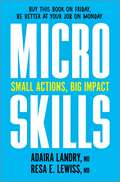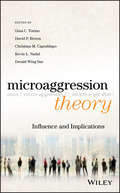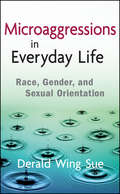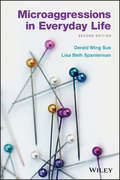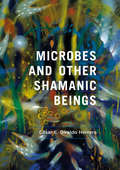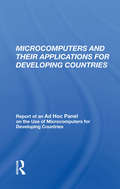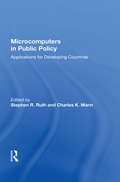- Table View
- List View
Mexifornia: A State of Becoming
by Victor Davis HansonRight-wing political commentator Hanson issues a broadside against Mexican immigration to California. He argues that continued immigration will lead to endemic poverty, eroded schools, soaring crime, and other problems. He presumes to describe the "mental landscape of the alien" describing immigrant life as one of poverty, frustration, envy, and inevitable degeneration. He recommends either cutting off immigration or enforcing rapid assimilation on newly arrived immigrants. Annotation (c)2003 Book News, Inc., Portland, OR (booknews.com)
Miami
by Joan DidionThe subject of this book is the fateful relationship between Cuban exiles of Miami and the larger body politic of the United States. Didion describes a place in which two profoundly different cultures co-exist, apparently with no understanding of each other, and where the myths of Cuban exile have not only become the everyday stuff of local politics, but have spread out from Miami to the White House and beyond.
Miami Transformed
by Michael Bloomberg Manny DiazSix-year-old Manuel Diaz and his mother first arrived at Miami's airport in 1961 with little more than a dime for a phone call to their relatives in the Little Havana neighborhood. Forty years after his flight from Castro's Cuba, attorney Manny Diaz became mayor of the City of Miami. Toward the end of the twentieth century, the one-time citrus and tourism hub was more closely associated with vice than sunshine. When Diaz took office in 2001, the city was paralyzed by a notoriously corrupt police department, unresponsive government, a dying business district, and heated ethnic and racial divisions. During Diaz's two terms as mayor, Miami was transformed into a vibrant, progressive, and economically resurgent world-class metropolis.In Miami Transformed: Rebuilding America One Neighborhood, One City at a Time, award-winning former mayor Manny Diaz shares lessons learned from governing one of the most diverse and dynamic urban communities in the United States. This firsthand account begins with Diaz's memories as an immigrant child in a foreign land, his education, and his political development as part of a new generation of Cuban Americans. Diaz also discusses his role in the controversial Elián González case. Later he details how he managed two successful mayoral campaigns, navigated the maze of municipal politics, oversaw the revitalization of downtown Miami, and rooted out police corruption to regain the trust of businesses and Miami citizens.Part memoir, part political primer, Miami Transformed offers a straightforward look at Diaz's brand of holistic, pragmatic urban leadership that combines public investment in education and infrastructure with private sector partnerships. The story of Manny Diaz's efforts to renew Miami will interest anyone seeking to foster safer, greener, and more prosperous cities.
Miami in the Anthropocene: Rising Seas and Urban Resilience
by Stephanie WakefieldReimagining adaptation amidst climate change–driven mutations of urban space and life Between its susceptibility to flooding and an ever-expanding real estate market powered by global surges of people and capital, Miami is an epicenter of the urban Anthropocene and a living laboratory for adaptation to sea level rise. Miami in the Anthropocene explores the social, environmental, and technical transformations involved in climate adaptation infrastructure and imaginaries in a global city seen as climate change ground zero. Using Miami as a compelling microcosm for understanding the complex interplay between urbanization and environmental upheaval in the twenty-first century, Stephanie Wakefield shows how &“aqua-urban futures&” are being imagined for the city, from governmental scenario exercises for severe weather events to proposals to transform the city&’s metropolitan area into an archipelago of islands connected by bridges. She examines the shifts reweaving the fabric of urban life and presents designs that imagine dramatic new ways of living with water. Grounded in the dynamic landscape of Miami but reaching far beyond its shores, Miami in the Anthropocene delves into the broader debates shaping urban thought and practice in the Anthropocene. Focusing on postresilience urban designs, Wakefield illuminates the path toward a future where cities embrace opportunities for evolution rather than merely for survival.
Miami’s Forgotten Cubans
by Alan A. AjaAlan A. Aja argues that post-1958 Afro-Cuban reception and adaptation experiences were vastly different than their predominantly "white" co-ethnics in South Florida, much due to processes of race-based social distancing operating within the Cuban-American community.
Michael Dummett and the Theory of Meaning (Routledge Revivals)
by Darryl GunsonPublished in 1998, this book argues that in recent decades, Anglo-American philosophy of language has been captivated by the idea that the key to progress in this area of philosophy lies in investigating the possibility of constructing a theory of meaning. This text provides an in-depth critique of the Davidsonian suggestion that Tarski's work on formal definitions of truth is an important element in allowing us to understand the form that the theory of meaning should take.
Michel Foucault (International Library of Essays in the History of Social and Political Thought)
by David OwenMichel Foucault was one of the twentieth century’s most influential thinkers whose work has unsettled and transformed the field of social philosophy and the social sciences. The essays and articles selected for this volume are written by many of the most important of Foucault’s interpreters and interlocutors and show the range of Foucault’s influence and the debates it has provoked about Foucault’s own approaches and in relation to substantive areas of social philosophy and social science such as power, critique, enlightenment, law, governance, ethics and truthfulness. This volume provides a comprehensive introduction to, and overview of, the development of Foucault’s thought and demonstrates its enduring significance on our understanding of how we have become what we are.
Michel Foucault and Sexualities and Genders in Education: Friendship as Ascesis (Queer Studies and Education)
by Nelson M. Rodriguez David Lee CarlsonThis book examines, within the context and concerns of education, Foucault’s reflections on friendship in his 1981 interview “Friendship as a Way of Life.” In the interview, Foucault advances the notion of a homosexual ascesis based on experimental friendships, proposing that homosexuality can provide the conditions for inventing new relational forms that can engender a homosexual culture and ethics, “a way of life,” not resembling institutionalized codes for relating. The contributors to this volume draw from Foucault’s reflections on ascesis and friendship in order to consider a range of topics and issues related to critical studies of sexualities and genders in education. Collectively, the chapters open a dialogue for researchers, scholars, and educators interested in exploring the importance and relevance of Foucault’s reflections on friendship for studies of schooling and education.
Michel Foucault: The Will To Truth (Social Science Paperbacks Ser.)
by Alan SheridanFirst Published in 2004. Routledge is an imprint of Taylor & Francis, an informa company.
Michel de Certeau: Cultural Theorist (Published in association with Theory, Culture & Society)
by Prof Ian Buchanande Certeau is often considered to be the theorist of everyday life par excellence. This book provides an unrivalled critical introduction to de Certeau's work and influence and looks at his key ideas and asks how should we try to understand him in relation to theories of modern culture and society. <p><p> Ian Buchanan demonstrates how de Certeau was influenced by Lacan, Merleau-Ponty and Greimas and the meaning of de Certeau's notions of `strategy', `tactics', `place' and `space' are clearly described. The book argues that de Certeau died before developing the full import of his work for the study of culture and convincingly, it tries to complete or imagine the directions that de Certeau's work would have taken, had he lived.
Michelangelo's Finger: An Exploration of Everyday Transcendence
by Raymond TallisIn this startlingly original and persuasive book, Raymond Tallis shows that it is easy to underestimate the influence of small things in determining what manner of creatures humans are. He argues that the independent movement of the human index finger is one such easily overlooked factor. Indeed, not for nothing is the index finger called the "forefinger. " It is the finger we most naturally deploy when we want to pry objects out of small spaces, but it plays a far more significant role in an action unique to us among primates: pointing. Tallis argues that it is through pointing that the index finger made a significant contribution to the development of humans and to the creation of a human world separate from the rest of the natural world. Observing the ceiling of the Sistine Chapel and the hugely familiar and awkward encounter between Michelangelo's God and Man through their index fingers, Tallis identifies the artist's intuitive awareness of the central role of the index finger in making us unique. Just as the reaching index fingers of God and Man are here made central to the creation of our kind, so Tallis believes that the seemingly simple act of pointing, which is used in a wide variety of ways, is central to our extraordinary evolution.
Michigan: A Geography
by Lawrence M. SommersMichigan is truly a "Great Lake State": the two peninsulas, many islands, and 3,100 miles of shoreline on four of the Great Lakes give the state a unique location and a diverse physical environment. The natural landscape is largely the result of erosion and deposition of surface materials during the Great Ice Age. Glacial ridges alternate with till plains and lake bottoms to give Michigan a varied topography and great contrasts in soil fertility. The book, through the use of text, photographs, and maps (drawn especially for this volume by Sherman Hollander), stresses the relationships between this varied natural resource base and the economic, social, and political geography of Michigan. Emphasis is placed on the demographic character, the historical background, and the natural and human resources that have led to Michigan becoming one of the principal manufacturing states in the United States. The book also looks at agriculture and recreation and tourism, which, along with manufacturing, are the major bases of the state's economic development. The regional coverage focuses on the urban dominance of Detroit. This comprehensive overview of Michigan geography closes with an analysis of some of the major quality of life issues in the state and a short glimpse into the future.
Michigan: A State of Environmental Justice?
by Bunyan Bryant and Elaine HockmanMichigan: A State of Environmental Justice? focuses attention on the byproducts of growth and development in the state of Michigan and describes who wins and who loses. Over the years while growth and development have been good for some, it has been devastating for others; the byproducts of growth and development have threatened the lives of people who breathe polluted air, who are exposed to contaminated water, and whose children play on polluted soil. People affected by toxins must organize to protect themselves, their families, and their communities from environmental harm. Let us be clear right from the beginning. We are not against economic growth and development; we are against certain kinds of economic growth and development--i.e., growth and development that expose people to unnecessary harm. We feel it is possible to have economic growth and development with environmental protection. All of this is explored in Michigan: A State of Environmental Justice?
Michotte's Experimental Phenomenology of Perception (Routledge Library Editions: Phenomenology)
by Georges Thinès, Alan Costall and George ButterworthThis volume of collected papers, with the accompanying essays by the editors, is the definitive source book for the work of this important experimental psychologist. Originally published in 1991, it offered previously inaccessible essays by Albert Michotte on phenomenal causality, phenomenal permanence, phenomenal reality, and perception and cognition. Within these four sections are the most significant and representative of the Belgian psychologist's research in the area of experimental phenomenology. Extremely insightful introductions by the editors are included that place the essays in context. Michotte's ideas have played an important role in much research on the development of perception, and his work on social perception continues to be influential in social psychology. The book also includes some lesser-known aspects of his work that are equally important; for example, a remarkable set of articles on pictorial analysis.
Micro-Electronics and Telecommunication Engineering: Proceedings of 5th ICMETE 2021 (Lecture Notes in Networks and Systems #373)
by Rohit Sharma Sheng-Lung Peng Devendra Kumar Sharma Dmitry A. ZaitsevThe book presents high-quality papers from the Fourth International Conference on Microelectronics and Telecommunication Engineering (ICMETE 2021). It discusses the latest technological trends and advances in major research areas such as microelectronics, wireless communications, optical communication, signal processing, image processing, big data, cloud computing, artificial intelligence and sensor network applications. This book includes the contributions of national and international scientists, researchers, and engineers from both academia and the industry. The contents of this volume will be useful to researchers, professionals, and students alike.
Micro-Enterprise and Personalisation: What Size Is Good Care?
by Catherine Needham Kerry AllenShifts to independent delivery of health and social care services have led to increased numbers of micro-enterprises. Could these tiny organisations with just 5 or fewer employees be the best way of delivering cost-effective health and social care services in the context of decreased budgets and increased demands? What size is 'just right' for a care provider? This book explores size as an independent variable in care services, comparing outcomes and value for money across micro, small, medium and large organisations. Using interviews and surveys with 108 people using services and carers in 27 case-study organisations it focuses on the contribution micro-enterprises can make to the care sector.
Micro-blogging Memories
by Eileen Le HanThis book offers an in-depth account of social media, journalism and collective memory through a five-year analysis of Weibo, a leading Chinese micro-blogging platform, and prism of transitional China in a globalizing world. How does society remember public events in the rapidly changing age of social media? Eileen Le Han examines how various kinds of public events are shared, debated, and their historical significance and worthiness of remembrance highlighted on Weibo. Journalism plays a significant part in mobilizing collective remembering of these events, in a society with rapidly changing topics on the platform, the tightening state control, and nationalism on the rise. The first five years of Weibo reflect a dramatic change in Chinese society, where journalists, media professionals, and opinion leaders in other fields of expertise, together with ordinary citizens directly affected by these changes in everyday life collaborate to witness the rapid social transition.
MicroSkills: Small Actions, Big Impact
by Adaira Landry M.D. Resa E. Lewiss M.D.The promise of this book is simple: if you buy this book on Friday, you will be better at your job by Monday.MicroSkills is built on one core, easy-to-learn principle: every big goal, complicated task, healthy habit, and, yes, even what we think of as character traits, can be broken down into small, learnable, skills that can be practiced, and incorporated real-time. We call these: MicroSkills.As award winning physicians, educators, and mentors we hear the gamut of challenges with navigating the workplace. And when we learn a lesson we often wish we had learned it earlier. MicroSkills is packed with the privileged information that you want delivered to you as efficiently as possible.In MicroSkills you will learn How to build your career without breaking yourself How to manage your task list to get work done How to build and maintain your professional reputation How to become a subject matter expert How to grow and nurture your network How to become a better communicator and so much more...MicroSkills is the gift we wish we had received early in our careers.
Microaggression Theory: Influence and Implications
by Derald Wing Sue Kevin L. Nadal Gina C. Torino David P. Rivera Christina M. CapodilupoGet to know the sociopolitical context behind microaggressions Microaggressions are brief, everyday exchanges that send denigrating messages to certain individuals because of their group membership (e.g., race, gender, culture, religion, social class, sexual orientation, etc.). These daily, common manifestations of aggression leave many people feeling vulnerable, targeted, angry, and afraid. How has this become such a pervasive part of our social and political rhetoric, and what is the psychology behind it? In Microaggression Theory, the original research team that created the microaggressions taxonomy, Gina Torino, David Rivera, Christina Capodilupo, Kevin Nadal, and Derald Wing Sue, address these issues head-on in a fascinating work that explores the newest findings of microaggressions in their sociopolitical context. It delves into how the often invisible nature of this phenomenon prevents perpetrators from realizing and confronting their own complicity in creating psychological dilemmas for marginalized groups, and discusses how prejudice, privilege, safe spaces, and cultural appropriation have become themes in our contentious social and political discourse. Details the psychological effects of microaggressions in separate chapters covering clinical impact, trauma, related stress syndromes, and the effect on perpetrators Examines how microaggressions affect education, employment, health care, and the media Explores how social policies and practices can minimize the occurrence and impact of microaggressions in a range of environments Investigates how microaggressions relate to larger social movements If you come across the topic of microaggressions in your day-to-day life, you can keep the conversation going in a productive manner—with research to back it up!
Microaggressions and Marginality
by Sue Derald WingA landmark volume exploring covert bias, prejudice, and discrimination with hopeful solutions for their eventual dissolution Exploring the psychological dynamics of unconscious and unintentional expressions of bias and prejudice toward socially devalued groups, Microaggressions and Marginality: Manifestation, Dynamics, and Impact takes an unflinching look at the numerous manifestations of these subtle biases. It thoroughly deals with the harm engendered by everyday prejudice and discrimination, as well as the concept of microaggressions beyond that of race and expressions of racism. Edited by a nationally renowned expert in the field of multicultural counseling and ethnic and minority issues, this book features contributions by notable experts presenting original research and scholarly works on a broad spectrum of groups in our society who have traditionally been marginalized and disempowered. The definitive source on this topic, Microaggressions and Marginality features: In-depth chapters on microaggressions towards racial/ethnic, international/cultural, gender, LGBT, religious, social, and disabled groups Chapters on racial/ethnic microaggressions devoted to specific populations including African Americans, Latino/Hispanic Americans, Asian Americans, indigenous populations, and biracial/multiracial people A look at what society must do if it is to reduce prejudice and discrimination directed at these groups Discussion of the common dynamics of covert and unintentional biases Coping strategies enabling targets to survive such onslaughts Timely and thought-provoking, Microaggressions and Marginality is essential reading for any professional dealing with diversity at any level, offering guidance for facing and opposing microaggressions in today's society.
Microaggressions in Everyday Life
by Derald Wing SuePraise for Microaggressions in Everyday Life"In a very constructive way, Dr. Sue provides time-tested psychological suggestions to make our society free of microaggressions. It is a brilliant resource and ideal teaching tool for all those who wish to alter the forces that promote pain for people."--Melba J. T. Vasquez, PhD, ABPPPresident, American Psychological Association"Microaggressions in Everyday Life offers an insightful, scholarly, and thought-provoking analysis of the existence of subtle, often unintentional biases, and their profound impact on members of traditionally disadvantaged groups. The concept of microaggressions is one of the most important developments in the study of intergroup relations over the past decade, and this volume is the definitive source on the topic."--John F. Dovidio, PhD Professor of Psychology, Yale University"Derald Wing Sue has written a must-read book for anyone who deals with diversity at any level. Microaggressions in Everyday Life will bring great rewards in understanding and awareness along with practical guides to put them to good use."--James M. Jones, PhD Professor of Psychology and Director of Black American Studies, University of Delaware"This is a major contribution to the multicultural discourse and to understanding the myriad ways that discrimination can be represented and its insidious effects. Accessible and well documented, it is a pleasure to read."--Beverly Greene, PhD, ABPP Diplomate in Clinical Psychology and Professor of Psychology, St. John's UniversityA transformative look at covert bias, prejudice, and discrimination with hopeful solutions for their eventual dissolutionWritten by bestselling author Derald Wing Sue, Microaggressions in Everyday Life: Race, Gender, and Sexual Orientation is a first-of-its-kind guide on the subject of microaggressions. This book insightfully looks at the various kinds of microaggressions and their psychological effects on both perpetrators and their targets. Thought provoking and timely, Dr. Sue suggests realistic and optimistic guidance for combating--and ending--microaggressions in our society.
Microaggressions in Everyday Life: Race, Gender, And Sexual Orientation
by Derald Wing Sue Lisa SpaniermanThe essential, authoritative guide to microaggressions, revised and updated The revised and updated second edition of Microaggressions in Everyday Life presents an introduction to the concept of microaggressions, classifies the various types of microaggressions, and offers solutions for ending microaggressions at the individual, group, and community levels. The authors—noted experts on the topic—explore the psychological effects of microaggressions on both perpetrators and targets. Subtle racism, sexism, and heterosexism remain relatively invisible and potentially harmful to the wellbeing, self-esteem, and standard of living of many marginalized groups in society. The book examines the manifestations of various forms of microaggressions and explores their impact. The text covers: researching microaggressions, exploring microaggressions in education, identifying best practices teaching about microaggressions, understanding microaggressions in the counseling setting, as well as guidelines for combating microaggressions. Each chapter concludes with a section called "The Way Forward" that provides guidelines, strategies, and interventions designed to help make our society free of microaggressions. This important book: Offers an updated edition of the seminal work on microaggressions Distinguishes between microaggressions and macroaggressions Includes new information on social media as a key site where microaggressions occur Presents updated qualitative and quantitative findings Introduces the concept of microinterventions Contains new coverage throughout the text with fresh examples and new research findings from a wide range of studies Written for students, faculty, and practitioners of psychology, education, social work, and related disciplines, the revised edition of Microaggressions in Everyday Life illustrates the impact microaggressions have on both targets and perpetrators and offers suggestions to eradicate microaggressions.
Microbes and Other Shamanic Beings
by César E. Giraldo HerreraShamanism is commonly understood through reference to spirits and souls. However, these terms were introduced by Christian missionaries as part of the colonial effort of conversion. So, rather than trying to comprehend shamanism through medieval European concepts, this book examines it through ideas that started developing in the West after encountering Amerindian shamans. Microbes and Other Shamanic Beings develops three major arguments: First, since their earliest accounts Amerindian shamanic notions have had more in common with current microbial ecology than with Christian religious beliefs. Second, the human senses allow the unaided perception of the microbial world; for example, entoptic vision allows one to see microscopic objects flowing through the retina and shamans employ techniques that enhance precisely these kinds of perception. Lastly, the theory that some diseases are produced by living agents acquired through contagion was proposed right after Contact in relation to syphilis, an important subject of pre-Contact Amerindian medicine and mythology, which was treasured and translated by European physicians. Despite these early translations, the West took four centuries to rediscover germs and bring microbiology into mainstream science. Giraldo Herrera reclaims this knowledge and lays the fundaments for an ethnomicrobiology. It will appeal to anyone curious about shamanism and willing to take it seriously and to those enquiring about the microbiome, our relations with microbes and the long history behind them.
Microcomputers And Their Applications For Developing Countries
by National Research Council Office of International Affairs Board On Science Technology for International DevelopmentMicrocomputers are an increasingly important tool in all aspects of development as the need to handle and assimilate vast quantities of information becomes ever more critical for both the international development community and the developing countries. In addition, the microcomputer represents the first significant technological advance that a dev
Microcomputers In Public Policy: Applications For Developing Countries
by Charles K. Mann Stephen R. RuthThis book presents a series of perspectives on the use of automation in the formulation and execution of public policy initiatives in developing nations. It focuses on the use of the most pervasive new automation technology in the developed world—the microcomputer.

